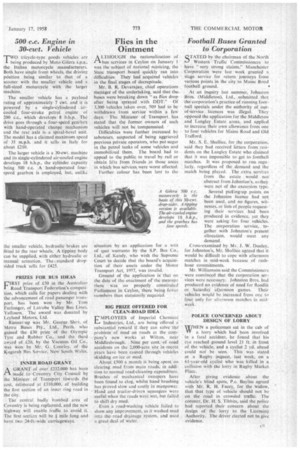Flies in the Ointment
Page 49

If you've noticed an error in this article please click here to report it so we can fix it.
A LTIIOUGH the nationalization of PA bus services in Ceylon on January I was the subject of national rejoicing, the State transport board quickly ran into difficulties. They had acquired vehicles in the final stages of decrepitude.
Mr. B. R. Devarajan, chief operations manager of the undertaking, said that thebuses were breaking down "as flies drop after being sprayed with DDT." Of 3300 vehicles taken over, 509 had to be withdrawn from service within a few clays. The Minister of Transport. has stated that the former owners of. such vehicles will not be Compensated.
Difficulties were further increased by saboteurs, suspected of being aggrieved previous private operators, who put sugar in the petrol tanks of some vehicles and immobilized them. The board had to appeal to the public to travel by rail or obtain lifts from friends in those areas in which bus services, were worst affected. . Further colour has been lent to the situation by an application for a writ of quo warranto by the S.P. Bus Co., Ltd., of Kandy, who wish the Supreme Court to decide that the board's acquisition of their assets under the Motor Transport Act, 1957, was invalid.
Ground of the application is that on the date of the enactment of the rnea,tiw. there was no properly constituted Parliament in Ceylon, there being fo■ei
• members than statutorily required. .
BIG PRIZE OFFERED FOR CLEAN-ROAD IDEA. L'MPLOYEES of Imperial Chemical Industries, Ltd., are being offered substantial reward if they can solve the problem of mud on roads at the cornpany's new works at Wilton, near Middlesbrough. Nine per cent. of road accidents on the 2,000-acre site in recent years have been caused through vehicles skidding on ice or mud.
About .E500 a month is being spent oil clearing mud from main roads, in addition to normal road-cleaning expenditure. Brushes of mechanical sweepers have been found to clog, whilst hand brushing has proved slow and costly in manpower. Hand and tractor-driven squeegees were useful when the roads were wet, but failed to shift dry mud.
Even a road-washing vehicle failed to show any improvement, as it washed mud into the •road drainage system. and used a great deal of water.
















































































































